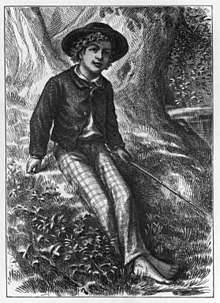Billy Boy
"Billy Boy" is a traditional folk song and nursery rhyme found in the United States, in which "Billy Boy" is asked various questions, and the answers all center around his quest to marry a girl who is said to be too young to leave her mother.
It has a Roud Folk Song Index number of 326. It is a variant of the traditional English folk song "My Boy Billy", collected by Ralph Vaughan Williams and published by him in 1912 as number 232 in Novello's School Songs.
Origins and interpretations
The tone of the nursery rhyme is ironic and teasing, both the question and answer form[1]:
Oh, where have you been, Billy Boy, Billy Boy?
Oh, where have you been, Charming Billy?
I have been to seek a wife, she's the joy of my whole lifeBut she's a young thing and cannot leave her mother
[2]
The narrative of the song have been related by some to "Lord Randall", a murder ballad from the British Isles, in which the suitor is poisoned by the woman he visits.[3]
By contrast, Robin Fox uses the song to make a point about cooking and courtship, and observes that:
Feeding has always been closely linked with courtship […] With humans this works two ways since we are the only animals who cook: the bride is usually appraised for her cooking ability. (“Can she bake a cherry pie, Billy boy, Billy boy?”) In some cultures this is far more important than her virginity.[4]
The song was also parodied in 1941 by Pete Seeger and Lee Hays in an anti-war protest song of the same name.[5]
In popular culture
A line from the song was adapted as the title for Henry Jaglom's 1983 film Can She Bake a Cherry Pie?, which concerns a middle-aged New York City musician who, after being dumped by her husband, develops a relationship with a middle-aged divorced social worker. The song "Billy Boy" is also performed in the film.[6]
Recordings
- Further variants have been recorded, that greatly extend the number of verses and tasks that the wife can perform. An extended version of the song in which the lover performs many tasks besides the cherry pie was collected by Alan Lomax and John Avery Lomax: it appears in American Ballads and Folk Songs. The Lomax version names the woman being courted Betsy Jane.[7]
- A version of the song by Jerry Lee Lewis was released on the 1975 album, Rare, Vol. 1.[8][2]
- Ahmad Jamal covered the song in his Poinciana album from 1951.
- Miles Davis covered Ahmad Jamal's version in his 1958 album Milestones.
See also

References
- More type 43f43f: see Bruce P. Hayes, Margaret MacEachern, Quatrain Form in English Folk Verse
- Billy Boy — Jerry Lee Lewis — Genius.com
- Fox, Dan (2003) "Billy Boy" in A Treasury of Children's Songs New York: Macmillan. ISBN 0-8050-7445-7, ISBN 978-0-8050-7445-1
- Fox, Robin: Food and Eating: An Anthropological Perspective. Social Issues Research Centre. p.11; see also Fox, Robin (1994): The Challenge of Anthropology: Old Encounters and New Excursions. Transaction Publishers, ISBN 156000827X
- http://www.protestsonglyrics.net/Anti_War_Songs/Billy-Boy.phtml
- Can She Bake a Cherry Pie? trailer, YouTube
- "American ballads & Folk Songs - Page 0420". Traditionalmusic.co.uk. Retrieved 2014-01-30.
- "Rare, Vol. 1 - Jerry Lee Lewis | Songs, Reviews, Credits, Awards". AllMusic. Retrieved 2014-01-30.